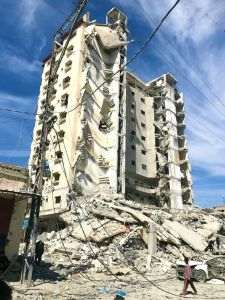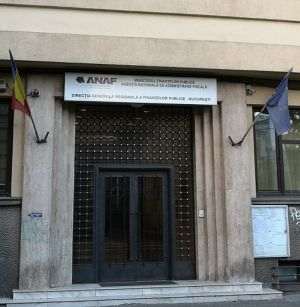The only event which periodically makes the Bucharest Stock Exchange an interesting subject to write about, takes place today - the revocation of its management and the election of a new Board of Directors, decisions which are on the agenda of the General Shareholder Meeting, summoned last year, at the request of a group of brokers backed by banks.
The market really isn't exciting.
Just like a huge outdoor banner posted on the wall of the Unirea Store said, a few years ago: "What are you doing here? Go home!"
The secondary offering of Petrom and its failure were the only real event that the market had last year.
A whole year, and just one event.
How sad.
Other than that, nothing.
Of course, plenty of flimsy issues: here's my resignation, give me your resignation, give me your resignation again, put the Polish guy on the board, give me the "money", get the Polish guy out, out with Farmache, out with Ionescu, let Farmache stay - hush!, - let Ionescu stay, kick him out, because he had no results, but yet we are reporting results.
What is this all about?
Really, what is this all about?!
Let's let Ştefan Boboc explain it: "We are an incipient, but very competitive market, because we are ranked third in the world in terms of number of shares issued".
With the few thousand active accounts, the Bucharest Stock Exchange is not even on the map of its own country, much less on that of Europe.
Regardless, a few brokers and "civilians" at the core of the tiny Bucharest Stock Exchange are going to clash in an attempt to decide who gets to lead it, microscopic as it is.
But they have no strategies at all!
As far as I can tell, the first two issues which the BSE has (aside from weakness, lack of character and vision) are the lack of personality and the barrier to entry for small shareholders.
Brokers trade with their eyes on the movements of the NYSE.
They get their overall trend from it, they add in a little Oltchim, a pinch of SIFs and the Proprietatea Fund and they put the resulting dough in the oven to get their price.
Sure, the world's financial crisis has basically invalidated the relevancy of fundamental analysis, all over the world, annihilating the personality of any stock exchange, regardless of its size and tradition.
Sure, right now, the world's stock market is 100% driven by psychology, and 60% by software.
But in Romania, we were already using psychology before the crisis.
Foreigners have actually doing what we used to do long before they did.
We were the pioneers of the global financial crisis - we can be proud.
Hence the "brilliant" strategy of getting "Adidas" listed on the local ATS.
I have nothing against that.
We now have their stocks as well.
That's great!
But why don't we have some of our own?
Having "Adidas" on the ATS does not ensure, in any way that capital will flow towards the companies that deserve it, of those listed on the main tier of the Romanian stock market.
Having "Adidas" on the ATS will enhance to an extent, the main theoretical role of the capital market - entering and exiting from businesses, on an individual level, but it doesn't help in any way the financing of the domestic listed companies (in fact, it even seems to hinder it, and we should be trying to determine the benefits and the drawbacks, but who is going to do that?!).
An aspect which was overlooked by the community of the Stock Exchange, on one hand because we are not running IPOs anyway, and, on the other hand, because there is no group or personality that seems to be interested in the idea (which does not exist anyway) of the development of the market as a whole.
Developing the market, making the stock market serve the real economy?!
Those are abstract notions.
The second problem -the barrier to entry on the stock market.
You try to join the market and you end up hitting a wall, and then slide down like in the cartoons.
You can only join the market through brokers.
You can't do it directly.
Yes, I know, it's the same thing abroad (now if that isn't a valid argument, I don't know what is!, I wonder how those folks abroad came to the conclusion that trading on the stock exchange should be done through brokers?, did they go with the "that's how they do it abroad!" line as well?!).
It's not alright, but I get it, brokers are looking to make easy money.
They wouldn't be the first, nor the last.
Notaries do the same thing.
But, naturally, they have working hours, but they also have to sleep, go on dates, take care of the kids, please their mothers-in-law.
If you want to open an account outside the working hours, you'll end up slamming your face against the wall.
Just like with any other kind of store.
Except the brokers' store isn't working!
Perhaps it really should be turned into a 24/7 business!
Go out on the corner!
Gypsies are smart enough to do it, you aren't!
Even the gypsies know what they have to do...
People should be trading everywhere!
It's awful isn't it?!
It's unheard of.
Perhaps you shouldn't even be reading this article, it's becoming a ramble.
Let's assume a guy wants to sell 41 shares - a voucher from the mass privatization program.
He won't be able to.
You can't bother our brokers with such petty stuff.
You expect them to get out of bed for 41 shares?!
It doesn't matter to them that there are about 41 million shareholders with 41 shares each?!
If you've inherited 41 shares, then you might as well forget about them.
The inheritance fee far exceeds the market value.
You might as well bury the shares together with the deceased.
Of course, it could happen that they've been stolen - some crook may have stolen them from you without you even knowing it, you know what happened at the Central Depository? - but it's not even worth it to check, since you can't do anything with them.
Considering our mortality rate of 11%, there could be 5 to 600,000 heirs (perhaps even more), who just run face first into the concrete door of the BSE.
About twenty million shares are buried in the cemetery because of the way the market works, but that's not something to write about.
Farmache, Anghel or Dan Paul, on the other hand....
Something worth writing about is that none of them has any program worth talking about.
The topic is that the "Grand Master of the BSE Lodge" is called Florin Pogonaru or Eugen Voicu.
Two names from way back.
The former furiously opposed the distribution of free BSE stock to brokers (they deserved them, but judging by what happened after their allocation, it would seem he was right - the BSE should not have become a joint stock company).
The latter, in spite of several five-year suspensions from the stock market, managed to clean up his name, even though his name remains associated with the fall of mutual funds of March 28th, 1996 - well, the sins of youth, what can you do...
Is there anyone, among the members of the market's community, who realizes the opportunity which the crisis of the financial markets provides for us?
I doubt it.
The fact that they have regressed to our level of incompetence is a sign that their model - the model we have been trying in vain to imitate - is a bad one, a model which failed.
We have the advantage that we do not have to cling to their bad model, like they do, while trying to revive it, not just because they can't see an alternative, but because they have invested in it and they would lose money.
We have nothing to lose.
We can abandon that model.
We could build a real market, that would serve us, our citizens, our companies and our country's economic policy.
And if they did that, then, of course, brokers would earn their well deserved fees.
Is any one of you capable of taking this on?
If you are, then elect the president of the Bucharest Stock Exchange.
But I can bet that you'll elect Anghel.
Or Dan Paul.
Or Farmache.
Or, maybe, if the rumors are true, you'll just reject the dismissal of the current board of directors altogether.
Which basically amounts to electing Farmache again.
Good luck!
• Scissors beats paper, paper beats rock, rock beats scissors
According to some predictions, all of the three candidates have a shot at winning the presidency of the BSE, depending on the pair that would be left to compete in the second round:
If Anghel and Farmache end up in the second round, Anghel wins;
If Farmache and Dan Paul go to the second round, Farmache wins;
If Dan Paul and Anghel go to the second round, Dan Paul wins.
An interesting insight into the interests of shareholders


























































